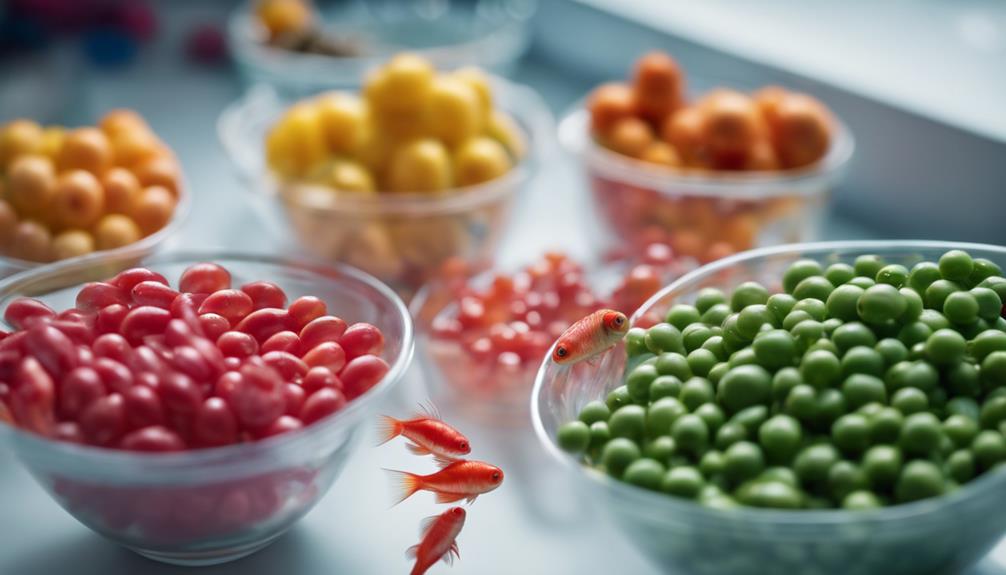What Are the Best Natural Betta Fish Diet Options?

When it comes to nourishing your betta fish, exploring the finest natural diet options can greatly enhance their well-being.
Have you ever considered the benefits of incorporating a variety of live foods into their meals? These options not only provide essential nutrients but also promote their natural hunting instincts.
Discovering the ideal balance of live, frozen, and fresh foods can be a rewarding journey that leads to a healthier and happier betta fish.
Live Foods
When feeding your betta fish live foods, make sure they're of high quality to maintain their health and vibrancy. Betta fish thrive on a varied diet, and live foods can provide essential nutrients that may be lacking in processed foods. For breeding tips, introducing live foods like brine shrimp or daphnia can stimulate breeding behaviors in bettas, increasing the chances of successful reproduction.
To guarantee your betta fish's best health, it's critical to pay attention to tank setup when using live foods. A well-maintained tank with appropriate filtration and water parameters is essential for the overall well-being of your fish. Live foods can sometimes introduce uneaten leftovers, which can quickly deteriorate water quality if not removed promptly. Regular tank maintenance, including water changes and debris removal, is essential to prevent any adverse effects on your betta's health. Remember, a clean and well-balanced tank environment is key to supporting the benefits of live foods in your betta fish's diet.
Frozen Foods
Introduce frozen foods into your betta fish's diet to provide a convenient and nutritious alternative to live foods. Frozen foods offer various nutritional benefits for your betta fish, including essential proteins, vitamins, and minerals. To prepare frozen foods for your betta, simply thaw them in a small amount of aquarium water to make sure they're at room temperature before feeding.
For best storage, keep your frozen foods in a freezer-safe container to maintain their freshness. It's recommended to feed your betta fish frozen foods 2-3 times a week as part of a balanced diet. Remember to thaw only the amount needed for each feeding to prevent wastage and maintain the quality of the frozen foods.
Incorporating frozen foods into your betta fish's feeding schedule can help enhance their overall health and vibrancy. By providing a varied diet that includes frozen foods along with other nutritious options, you can guarantee your betta receives essential nutrients for their well-being.
Fresh Vegetables
To further diversify your betta fish's diet and provide additional nutrients, consider incorporating fresh vegetables into their feeding routine. Vegetables offer a range of essential vitamins and minerals that can contribute to your betta's overall health and well-being. When selecting vegetables for your betta, opt for a variety to guarantee they receive a broad spectrum of nutrients. Some excellent choices include blanched peas, zucchinis, cucumbers, and spinach.
Feeding frequency is important when it comes to offering vegetables to your betta fish. Aim to provide fresh vegetables once or twice a week as part of a balanced diet. Overfeeding vegetables can lead to digestive issues, so it's essential to monitor your betta's consumption and adjust accordingly.
Remember to remove any uneaten vegetables from the tank promptly to maintain water quality. By incorporating a variety of fresh vegetables into your betta fish's diet and ensuring the right feeding frequency, you can promote their health and vitality.
High-Quality Pellets
High-quality pellets serve as a convenient and nutritionally balanced option for feeding your betta fish. These pellets are specially formulated to meet the dietary needs of bettas, providing essential nutrients to keep them healthy and vibrant. When choosing pellets for your betta fish, look for options that contain high-quality ingredients and are free from fillers and artificial additives.
Here are some key points to contemplate when selecting high-quality pellets for your betta fish:
- Protein Sources: Opt for pellets that list whole fish or fish meal as the primary protein sources. Fish protein is essential for bettas as they're carnivorous and require a diet rich in animal proteins.
- Essential Nutrients: Make sure that the pellets contain essential nutrients such as vitamins, minerals, and amino acids to support your betta fish's overall health and well-being.
- Limited Fillers: Choose pellets that have minimal fillers like wheat or soy, as these ingredients offer little nutritional value to your betta fish.
- Floating Pellets: Take into account selecting floating pellets, as they allow bettas to feed more naturally near the water's surface where they prefer to eat.
Homemade Recipes
Consider crafting homemade recipes as a nutritious and customizable option for feeding your betta fish. Achieving nutritional balance is important when preparing homemade meals for your betta. Remember to source fresh and high-quality ingredients to make sure your fish receives essential nutrients. Commonly used ingredients include brine shrimp, bloodworms, daphnia, and vegetables like peas or spinach.
When creating homemade recipes, you have the flexibility to experiment with different variations to cater to your betta's preferences and dietary needs. You can adjust portion sizes based on your fish's size and activity level. It's important to monitor your betta's response to the homemade recipes to determine what works best for them.
Homemade recipes offer a more natural and diverse diet compared to commercial options. By carefully selecting ingredients and preparing meals tailored to your betta, you can promote their health and well-being. Remember to research and consult with experts to make sure your homemade recipes provide a well-rounded diet for your betta fish.
Conclusion
In summary, providing a well-rounded diet for your betta fish is essential for their overall health and well-being. Incorporating live and frozen foods, fresh vegetables, high-quality pellets, and homemade recipes can guarantee they receive the necessary nutrients for ideal growth and vibrant colors.
By offering a variety of natural food options, you can help your betta fish thrive in their aquatic environment and lead a happy, healthy life.
